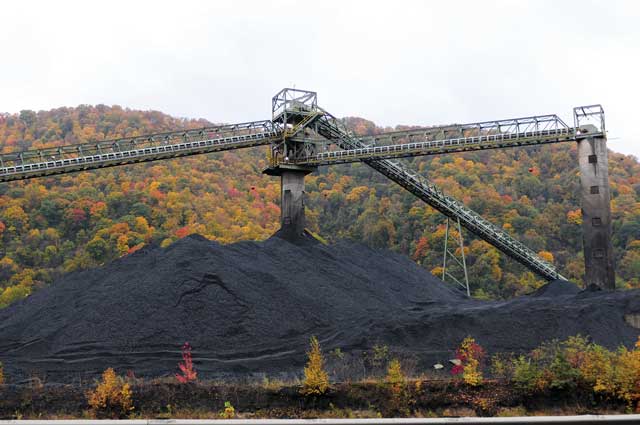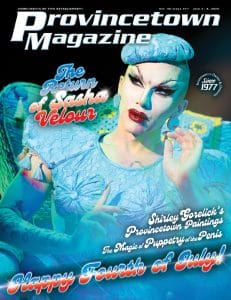Beth Stephens and Annie Sprinkle Photo by Jordan Freeman
by Steve Desroches
Beth Stephens was flying home to West Virginia in 2008 when she noticed something horrifying from 30,000 feet in the air. Mountain after mountain in her beautiful Appalachian home state had their tops blown clean off. It’s a process called mountaintop removal mining, used to extract the coal that has been the top economic engine for the region for almost two centuries. The mining practice has negatively impacted over 1 million acres of Appalachia in four states with 500 mountains blown out of existence in a region that is second to the Amazon in biodiversity.
An artist and activist Stephens is partners with famed former porn star and performance artist Annie Sprinkle. Together, through art and radical sex education, they’ve created “sexecology,” which explores the intersection of ecology and sexuality. The concept was already percolating by the time Stephens got an aerial view of the devastation to her beloved home eco-system, and ecology had already worked its way into the duo’s work. Thus began the ecosexual movement, a playful yet sincere field of thought and study, as well as performance and art, to transform the idea of Earth as mother to Earth as lover.
“We married the Earth in 2008,” says Stephens, by phone with Sprinkle at their home in San Francisco. “We were thinking about becoming partners with the Earth, but also making it a movement and a field of study.”
“We were already ecosexuals, we just didn’t have a name for it,” says Sprinkle. “It’s changed our work profoundly.”
Since then, Stephens and Sprinkle have held “ecosex weddings,” marrying elements of the Earth all over the world, from symbolically marrying rocks in Barcelona and the snow in the Canadian capital of Ottawa, to the Appalachian Mountains in Athens, Ohio. However, one of the first locations for the beginning of the ecosexual movement was Boston, where Sprinkle and Stephens presented Dirty Sex-Ecology or How to Make Love with the Earth as part of The Theater Offensive’s Out on the Edge Queer Theater Festival in 2009, followed the next day with a “sex-ecological” tour of the Boston Public Gardens showing the steamier side of the city’s puritanical roots.
The concept of creating a sexual identity as an “ecosexual” is beyond just genital sex, but a larger idea of nature and sensuality. When Stephens and Sprinkle ask who identifies as an ecosexual, they often get a few timidly raised hands, with some giggles or furrowed brows signaling confusion. But once they share the experience of having intimacy with the mountains, or the ocean, or a wildflower meadow, many realize that indeed they, too, are ecosexuals.

In 2013 Stephens directed Goodbye Gauley Mountain: An Ecosexual Love Story a documentary chronicling a trip home where the two introduce West Virginians to the ecosexual movement while also putting a spotlight on not just the environmental damage caused by mountaintop removal mining, but also the effects on human health as the practice produces a toxic sludge. Due to the weakening of the Clean Water Act, mining companies are not held accountable for their actions. The all-powerful mining companies also have decimated small communities throughout Appalachia, forcing residents out either by environmental degradation or by choking the local economy.
The film marvelously shows the open-mindedness of many in the region as two radical sex artists come to town blasting the preconceived ideas many around the country might cast onto the region with elitism and snobbery. Their work generated productive dialogue rather than people shouting past each other. Strangely enough, one of the places where they received a negative reaction was in the San Francisco’s Pride Parade, which Stephens described as rather “corporate.” While playfully suggesting that an “E” for ecosexual should be added to GLBTIQ, some more humorless participants accused them of trying to destroy the queer movement.
“Our society is an ecosystem,” says Stephens, a professor of art at the University of California, Santa Cruz. “We need to be in conversation rather than at each other’s throats.”
The film, which was first shown in Provincetown at the film festival in 2014 and again at a special screening at AMP Gallery by personal friend Debbie Nadolney, Goodbye Gauley Mountain will be shown as part of this year’s Appearances: Provincetown’s Green Arts Festival. It is the first of a planned trilogy, with the next two films – Water Makes Us Wet and Composting Is Hot – already in production.
While Stephens and Sprinkle won’t be at the screening, they do have long ties to Provincetown and hope to return, perhaps to marry the dunes, they say. Both have visited Provincetown frequently over the years, with Sprinkle living here for a year and half to finish her PhD in human sexuality from the Institute for Advanced Study of Human Sexuality. As far and wide as the couple have traveled, Provincetown holds a special place in their hearts….and elsewhere.
“We always say that San Francisco is the clitoris of America, but America has two,” says Sprinkle. “Provincetown is definitely America’s other clitoris.“
“Yes, its definitely one of our “E” spots,” says Stephens. “Yes, Provincetown makes us wet.”
Goodbye Gauley Mountain: An Ecosexual Love Story screens as part of Appearances: Green Arts Festival, on Saturday, May 7 at 6:30 p.m. in the Stanley Kunitz Room at the Fine Arts Work Center, 24 Pearl St., Provincetown. The screening is free (though donations are accepted.) To learn more about the ecosexual movement visit sexecology.org. For more about Appearances, visit their Facebook page.







